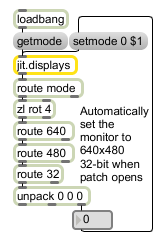Examples

Set and query monitor attributes
| bang | Equivalent to the message. Sends a count of the attached displays out the object's outlet in the form number-of-displays . | |
| coords | display-index [int] |
Sends the display screen coordinates for the display whose index is specified out the object's right outlet as a list in the form display-index left top bottom right . Displays are counted from 0 (0 is the primary display). |
| count | Sends a count of the attached displays out the object's outlet in the form number-of-displays . | |
| currentstate | display-index [int] |
Sends the current state of the display out the object's outlet as a list in the form display-index width height color-bit-depth refresh-rate . Note that LCD displays report a refresh rate of 0. |
| gammatable2matrix |
display-index [int] matrix-name [symbol] |
Copies the gamma table for the display specified by to the matrix named . |
| getmode | display-index [int] |
Sends available display modes for display specified by out the right outlet as a sequence of lists, one display per line. Each display is described by a list in the form display-index mode-index width height color-bit-depth refresh-rate . Note: LCD displays have a refresh rate of 0. |
| manual |
display-index [int] width [int] height [int] bit-depth [int] |
Macintosh only Sets the display to a configuration which provides the closest match for the ideal configuration specified by the arguments. |
| matrix2gammatable |
matrix-name [symbol] display-index [int] |
Copies the Jitter matrix named to the gamma table for the display specified by . On Windows, gamma tables with negative slope are not permitted, and will result in an error message. |
| mirror |
src-display-index [int] dst-display-index [int] |
Macintosh only Enables video mirroring of the display whose number is specified by to the display whose number is specified by . |
| move |
display-index [int] newxtop [int] newytop [int] |
Changes the logical screen location of the display whose number is specified by . Two additional arguments specify the new screen location. If a location is chosen which overlaps with the location of another display, a new non-overlapping location will be automatically assigned. The final position of the display after a can be verified using the message. |
| reset | Return displays to their snapshot state (see the method). Note that reset does not have any affect on video mirroring settings, which must be maintained manually. | |
| resetgamma | Return display gamma settings to their system default state. | |
| setmode |
display-index [int] mode-index [int] |
Change the display mode. The two arguments specify the display index, and the mode index (derived from the message). |
| snapshot | Saves the current display mode (on all active displays) for use with the and messages. A snapshot is automatically taken when the object is instantiated. | |
| unmirror | display-index [int] |
Macintosh only Disables video mirroring on the specified display. |
| Name | Type | g/s | Description |
|---|---|---|---|
| resetmode | int |
Macintosh only Display mode flag (default = 1) Enables or disables reset when the object is freed The jit.displays object remembers the original state of your system's display settings when the object is instantiated (display settings can also be saved using the message. A will cause the original display settings to be restored when the patch is closed or the object is otherwise freed. |
|
| gamma | float | (set) | Monitor gamma settings (Macintosh default = 0 1.8 1.8 1.8) (Windows default = 0 2.2 2.2 2.2) The first argument specifies the device. The latter three arguments are used as coefficients in the generation of power-curve gamma tables for the red, green and blue channels. 1.8 represents standard Macintosh gamma, while 2.2 represents standard Windows gamma. |

| Name | Description |
|---|---|
| jit.desktop | Copy the screen contents into a Jitter matrix |
| Tutorial 38: Basic Performance Setup | Tutorial 38: Basic Performance Setup |